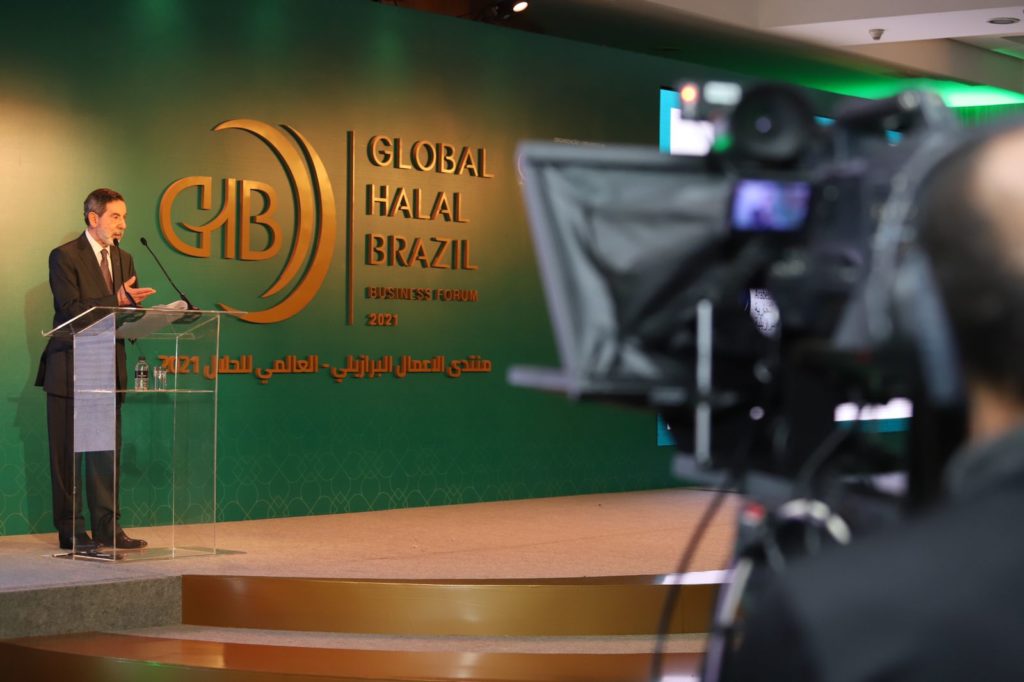São Paulo – All Islamic market segments, except for tourism, will return to pre-pandemic levels this year. This was one of the good news presented in the Global Halal Brazil business forum that started on Monday (6). Due to the pandemic, the event is hybrid, featuring the participation of a restricted group of guests at Hotel Renaissance in São Paulo.
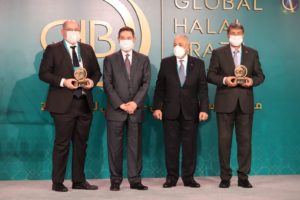
The figures on the consumption recovery was presented by Arab Brazilian Chamber of Commerce (ABCC) president Osmar Chohfi (pictured above) based on the latest edition of The State of Islamic Economic Report. The report points out promising prospects for this market that moves around USD 4.8 trillion a year taking into account food, cosmetics, medicines, clothing, entertainment, tourism and finance sectors.
Chohfi said that by 2024 the Islamic market activity is expected to grow by 18% to USD 5.7 trillion, with a two-digit increase across all sectors except for tourism, which will grow by only 7%. Halal products are those fit for Muslim consumption. In tourism it means facilities fit for Muslims like offering prayer rooms and halal food.
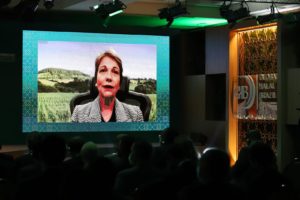
The Islamic market comprises 1.9 billion consumers across 57 countries composing the Organization of Islamic Cooperation (OIC) as well as other countries that are home to large Muslim communities such as France, Germany, the United Kingdom and the United States. According to Chohfi, this market will grow over the next years driven by the increase of the Islamic population and investments in halal economy.
Brazil’s Agriculture, Livestock and Supply minister Tereza Cristina participated in the forum remotely and stressed Brazil’s position as a global halal product supplier. “We already are the top supplier of these products for many OIC countries, and in some cases, Brazil has a share of over 75% in markets like poultry,” the minister said, congratulating the work of halal certifier Federation of Muslim Associations (FAMBRAS Halal). “Year after year you have made a difference for our country,” she said.
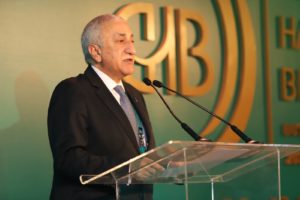
FAMBRAS Halal holds the forum together with the ABCC. FAMBRAS Halal chairman Mohamed Zoghbi spoke at the opening ceremony and said that halal went from something exclusive to Muslims to a global quality certification that is appreciated by vegans and conscious consumers.
Brazil is an established animal protein supplier, but the organizers of the forum want the country to become a major player in other segments of halal, too. “We know that Brazilian companies, with their creativity, potential and quality, can export a multitude of products beyond food like raw materials, cosmetics and more,” Zoghbi said.

Participating from their countries, Arab officials and experts wished Brazil success in the task of growing as a halal supplier. “That Brazil can successfully achieve its goals,” Bahrain’s Works, Municipality Affairs and Urban Planning minister Essam Bin Abdulla Khalaf. Khalaf said the halal industry is one of the fastest growing in the world. He talked about the work of Muslim countries, particularly in the Gulf, to unify the halal certifying standards, and that Bahrain was an active participant.
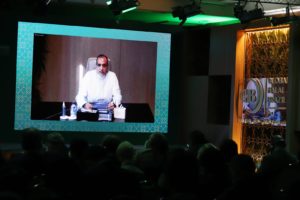
Talking from Saudi Arabia, Islamic Chamber of Commerce, Industry and Agriculture president Abdullah Saleh Kamel discussed how the institution works for halal and wished the ABCC success in strengthening Brazil-Islamic countries ties. He talked about the future of this market and the goals he sees as most important: the integration of the Islamic economy, the position of halal as an ethic principle and its expansion to non-Muslims.
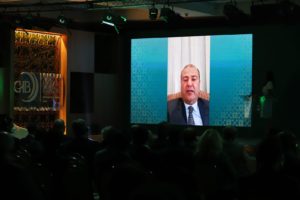
Participating remotely from Egypt, Union of Arab Chambers secretary-general Khaled Hanafy said the adherence to halal commerce increases daily and that countries are more and more interested about it. He also stressed the role of the ABCC in encouraging this market and discussed the segments it involves.
Speaking from Egypt on behalf of the Arab League secretary-general Ahmed Aboul Gheit, Soudad Najm, head of the Department of the Americas at the Arab League, underscored Brazil’s leading role in the halal industry. “The league supports all initiatives aiming to strengthen Brazil-Arab ties,” she said. Najm stressed that despite the political changes, Brazil-Arab relations remain strong as ever.
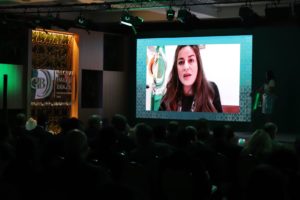
Ibraim Alzeben, dean of the Council of Arab Ambassadors in Brazil and ambassador of Palestine in Brazil, spoked in person in the forum. He said the participation in the event translates the interest of the council in building a constructive dialogue with beneficial outcomes for Brazil and the Arab countries and more products safe for consumption.
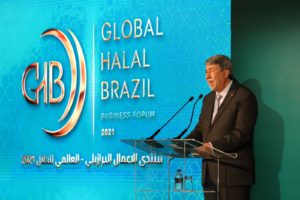
The opening ceremony also featured Brazilian Trade and Investment Promotion Agency (Apex-Brasil) president Augusto Pestana as well as Brazil former president Michel Temer, who delivered the keynote address of the day. Then experts, businesspeople and representatives of the public sector and institutions from Brazil and elsewhere discussed the halal topic in panels.
The forum runs through Wednesday (8) with the support of Apex-Brasil, BRF, Pantanal Trading, Portonave, and Iceport. It can be watched on the website of the event via prior registration or on the ABCC’s YouTube channel. It features translation into English and Portuguese.
Follow the complete forum coverage:
Read more about the GHB:
- Brazil’s Temer: “Halal could go beyond Islamic market”
- Brazil must promote image to diversity exports
- Islamic economics education was impacted by COVID-19
- Apex-Brazil wants to take halal to small enterprises
- Ready-to-eat foods are trend in halal
- Post-pandemic world to invest in public healthcare
- Halal: Brazilian food is safe and sustainable
Translated by Guilherme Miranda



